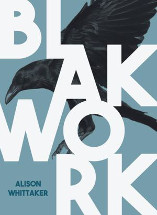Blakwork by Alison Whittaker

Magabala Books, 2018. ISBN 9781925360851
(Age: Senior secondary - Adult) Recommended. Poetry. White linen
washed by black hands, hangnails on worn hands . . . Whittaker
succinctly conjures images of colonisation, oppression and
segregation. She tells the story of abattoir life, the jobs the
black people do on the outskirts of country towns - the killwork. It
is stark and confrontative language, but also rich and poetic. She
is an artist with words.
Words are arranged like patterns on a page. To keep the integrity of
longer lines, sometimes the poems are arranged sideways, landscape
view. Other times, lines interweave alternately. She plays with
words - 'Beneviolence' with its repetitive versions of 'THIS IS GOOD
FOR YOU! THIS IS FOR YOUR GOOD' is simple but very effective.
Also very effective is the device of taking the forty-nine most
common three-word phrases in a text and arranging them, ranked, as a
poem - as with the judgement in the Trevorrow v State of South
Australia case, the inquest into the death of Ms Dhu, and the Mabo
vs Queensland decision. The phrases and the words used reveal
everything about the conflict of cultures; the legal terms
contrasting with the devastation of stolen children, the inhumanity
towards the person in custody, and the disregard for native
inhabitants of land.
Whittaker is a Gomeroi woman - she includes Gamilaraay words as well
as Aboriginal English in her poems; Aboriginal voices can clearly be
heard in her poetry. "Blakwork", with its 'bloodwork', 'heartwork',
'badwork', 'workwork', 'newwork', and lots of other kinds of 'work'
makes for a strong voice demanding to be heard.
Helen Eddy